Apollo.io Alternatives
Considering a switch from Apollo.io? This guide analyzes 10 alternatives, comparing their strengths and weaknesses to inform your decision.

Apollo.io is a popular tool for good reason. Many sales teams use it to find emails and phone numbers or for data enrichment. It performs well for these specific tasks and helps build B2B contact lists.
However, some users report occasional data inaccuracies or find the platform complex. For this reason, we analyzed the top alternatives, comparing their advantages and drawbacks to Apollo.io using G2 reviews. Let's get started.
Automate Sales Tasks with 11x
Repetitive sales tasks can consume your team's time. Digital workers can handle research, data entry, and outreach. This allows your sales representatives to close more deals.
11x provides digital workers trained for specific sales operations. You can explore how this approach might fit into your current sales process and potentially improve team productivity.
At 11x, we provide a GTM platform where our AI agents manage the sales process. Our agent Alice finds prospects, handles outreach on email and LinkedIn, and maintains your CRM, while Julian qualifies inbound leads and books meetings.
We combine data enrichment, outreach, and email warmup capabilities. This approach can replace several separate tools in a traditional GTM stack.
Apollo.io Alternatives
The following section reviews several Apollo.io alternatives. We will compare each option's pricing, main features, and its advantages and drawbacks relative to Apollo.io.
1) ZoomInfo SalesOS
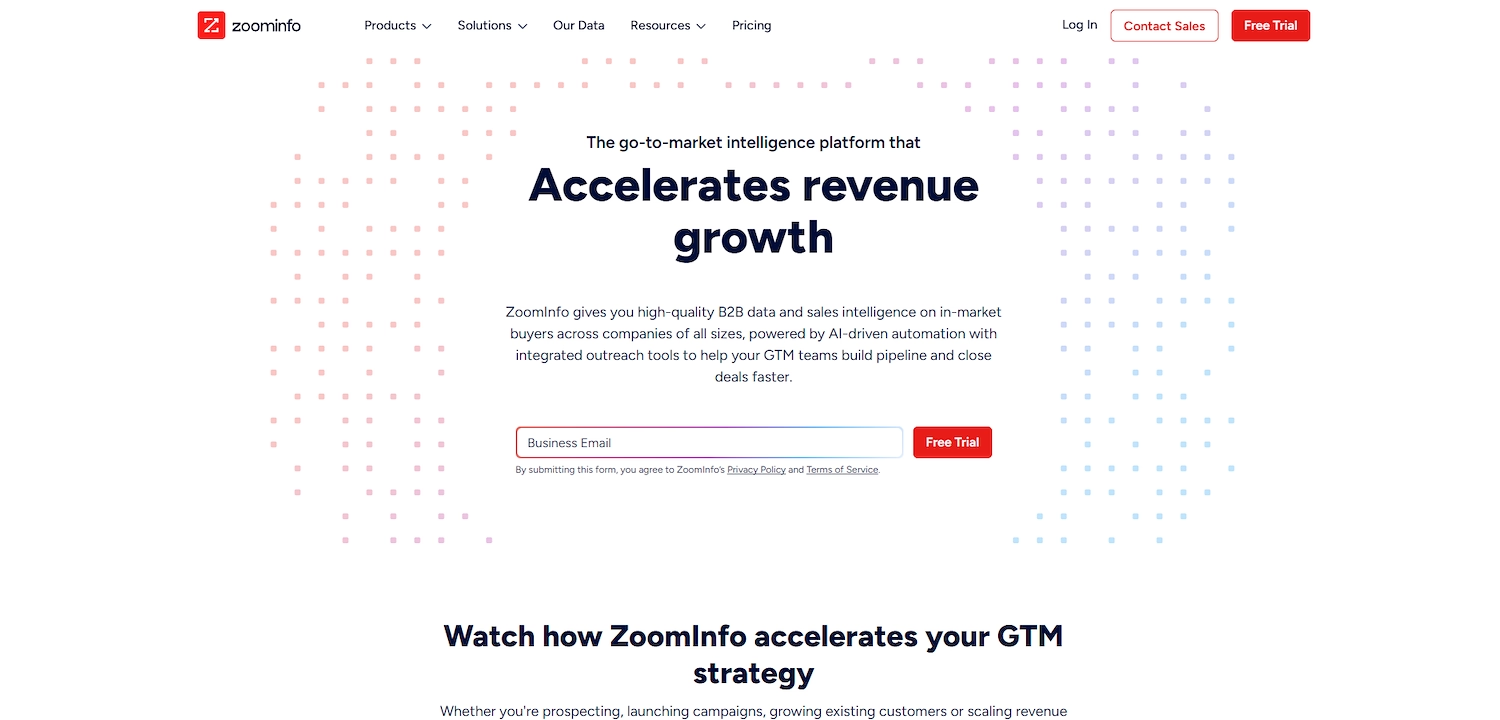
ZoomInfo SalesOS is a go-to-market intelligence platform for B2B organizations. It combines company and contact data with buyer-intent signals and engagement tools. The platform functions as a single operating system for revenue teams.
Users build lead lists with verified contact details and enrich data. The system helps identify in-market accounts and automates data hygiene and other revenue operations workflows.
ZoomInfo SalesOS's Main Features
- Tracks real-time buyer intent signals to identify prospects ready for outreach.
- Analyzes call and meeting interactions using its conversation intelligence tool, Chorus.
- Identifies anonymous website visitors to convert page views into potential sales pipeline.
- Includes a generative AI assistant, Copilot, to surface insights and draft outreach.
ZoomInfo SalesOS vs. Apollo.io: Key Differences
Average Review score: 4.5/5 stars based on 8,738 G2 reviews.
- ZoomInfo SalesOS includes Chorus, a conversation intelligence tool that analyzes sales calls and meetings. This provides deep insights into customer interactions, a feature not natively available in Apollo.io.
- The platform offers more direct buyer intent data to identify companies actively searching for solutions. This helps teams find in-market accounts more efficiently than with Apollo.io's broader prospecting functions.
- It can identify anonymous companies that visit your website, turning traffic into warm leads. This lead generation channel is a capability not present in Apollo.io.
- Its AI assistant, Copilot, gives specific, data-driven recommendations on who to contact and what to say. This level of AI-guided selling is more comprehensive than the AI features found in Apollo.io.
ZoomInfo Drawbacks Compared to Apollo.io
- ZoomInfo SalesOS represents a significant investment, which suits larger enterprises. In contrast, Apollo.io provides more flexible pricing plans accessible to smaller teams.
- The platform's setup can take around one month to complete. Some users report that Apollo.io has a faster implementation, which allows teams to start work sooner.
- It typically uses an annual, seat-based contract model. This approach is less adaptable than Apollo.io's credit system, which scales with a team's actual usage.
Pricing and Budget Considerations
ZoomInfo does not list pricing publicly, as it offers custom annual contracts geared toward enterprise clients. This model contrasts with Apollo.io's flexible, credit-based system, which can be more suitable for smaller teams or businesses with variable usage needs.
2) LinkedIn Sales Navigator
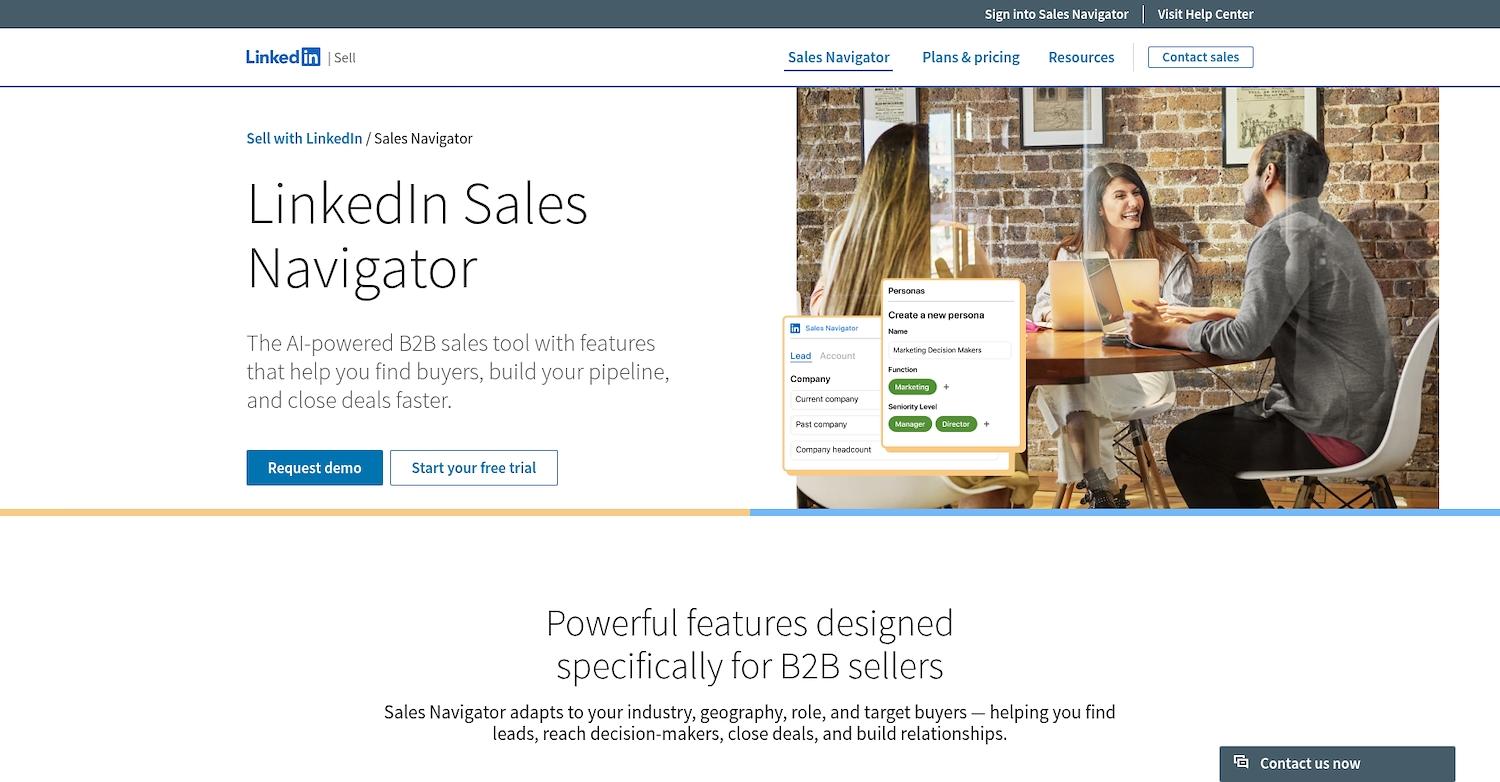
LinkedIn Sales Navigator is a sales intelligence tool inside the LinkedIn network. It helps sales professionals find and target relevant contacts with advanced search capabilities. The platform helps build connections with prospects.
It also provides insights on key accounts and leads. These details, such as job changes and company news, support timely engagement.
LinkedIn Sales Navigator's Main Features
- Offers advanced search filters to find and target relevant contacts within the LinkedIn ecosystem.
- Delivers insights on key accounts and leads, such as recent job changes or company news updates.
- Facilitates direct connection building with prospects through the platform's native networking tools.
LinkedIn Sales Navigator vs. Apollo.io
Average Review score: 4.3/5 stars based on 1,990 G2 reviews.
- LinkedIn Sales Navigator uses data directly from the LinkedIn network. This provides real-time updates on job changes and company news, a more direct source of information compared to Apollo.io's multi-source data aggregation.
- The tool focuses on building relationships within the LinkedIn platform. It allows users to send InMail and connect with prospects directly, which is different from Apollo.io's primary function of finding external contact details.
- Its advanced search filters are specific to LinkedIn's detailed professional data, such as a person's tenure in a role or their group memberships. This offers a different type of targeting than the filters in Apollo.io's database.
- Information like job titles and current employers is often more current because it comes directly from user-updated LinkedIn profiles. This can be more accurate than data in third-party databases like Apollo.io's, which may have a delay.
LinkedIn Sales Navigator Drawbacks vs. Apollo.io
- LinkedIn Sales Navigator does not provide external contact details like verified emails or phone numbers. This is different from Apollo.io, which builds contact lists for outreach outside the LinkedIn platform.
- The tool lacks features to create or automate multi-step email sequences. In comparison, Apollo.io allows users to manage outreach campaigns that combine various touchpoints.
- Its outreach can be limited by a monthly InMail credit allowance. This might be a constraint for high-volume sales teams, while Apollo.io's system often offers more flexibility for sending emails.
Pricing and Budget Considerations
LinkedIn Sales Navigator is positioned as a premium tool, and user reviews note its high price. In contrast, Apollo.io offers a flexible, credit-based system that can adapt to different budgets. For the most accurate pricing, we recommend visiting LinkedIn Sales Navigator's official website.
3) Lusha

Lusha is a sales intelligence platform that helps revenue teams find B2B leads across the globe. It uses AI to recommend high-value prospects and automates outreach through multiple channels, all in a single workflow.
Users build accurate lists, receive streams of new leads, and enrich CRM records. The system also helps prioritize outreach based on buyer-intent signals and maintains GDPR and CCPA compliance through its integrations with popular sales tools.
Lusha's Main Features
- Generates live, auto-updating lead lists that add new prospects at user-defined intervals.
- Records and analyzes sales meetings through its Lusha Conversations tool.
- Provides daily, ICP-based lists of companies and decision-makers from its recommendation engine.
- Holds certifications for GDPR, CCPA, and ISO 27701 & 27001, emphasizing legally obtained data.
Lusha vs. Apollo.io: Key Differences
Average Review score: 4.3/5 stars based on 1,516 G2 reviews.
- Lusha offers AI Prospect Playlists that automatically create and update lead lists. This is different from Apollo.io, where users typically build static lists manually.
- The platform emphasizes data compliance with GDPR, CCPA, and ISO certifications. This provides an extra layer of legal assurance compared to the standard data sourcing methods of Apollo.io.
- It includes Lusha Conversations, a tool that records and analyzes sales meetings. This feature for customer insights is not a native part of the Apollo.io platform.
- User reviews often highlight the simplicity of Lusha's Chrome extension to find contact details. This user experience can feel more direct for quick lookups compared to the workflow in Apollo.io's broader platform.
Lusha Drawbacks Compared to Apollo.io
- Lusha does not include a built-in tool to create multi-step outreach sequences. In comparison, Apollo.io allows users to build and automate entire email campaigns directly within its platform.
- The platform's search functionality may have fewer filters to build highly specific prospect lists. Apollo.io, for instance, offers more granular options, like a filter for the technology a company uses.
- It functions primarily as a contact data provider. This is different from Apollo.io, which combines data prospecting with sales engagement tools and offers a more unified workflow for sales teams.
- Some users report that contact information can occasionally be outdated. While this can happen with any data provider, Apollo.io's larger database sometimes provides more alternative contacts for a single prospect.
Pricing and Budget Considerations
Lusha offers a free plan, with paid tiers like its Pro plan at $36 per user per month. This per-seat model contrasts with Apollo.io's flexible, credit-based system, which can be more adaptable for teams with variable needs. For the most current information, we recommend visiting Lusha's official website.
4) Hunter
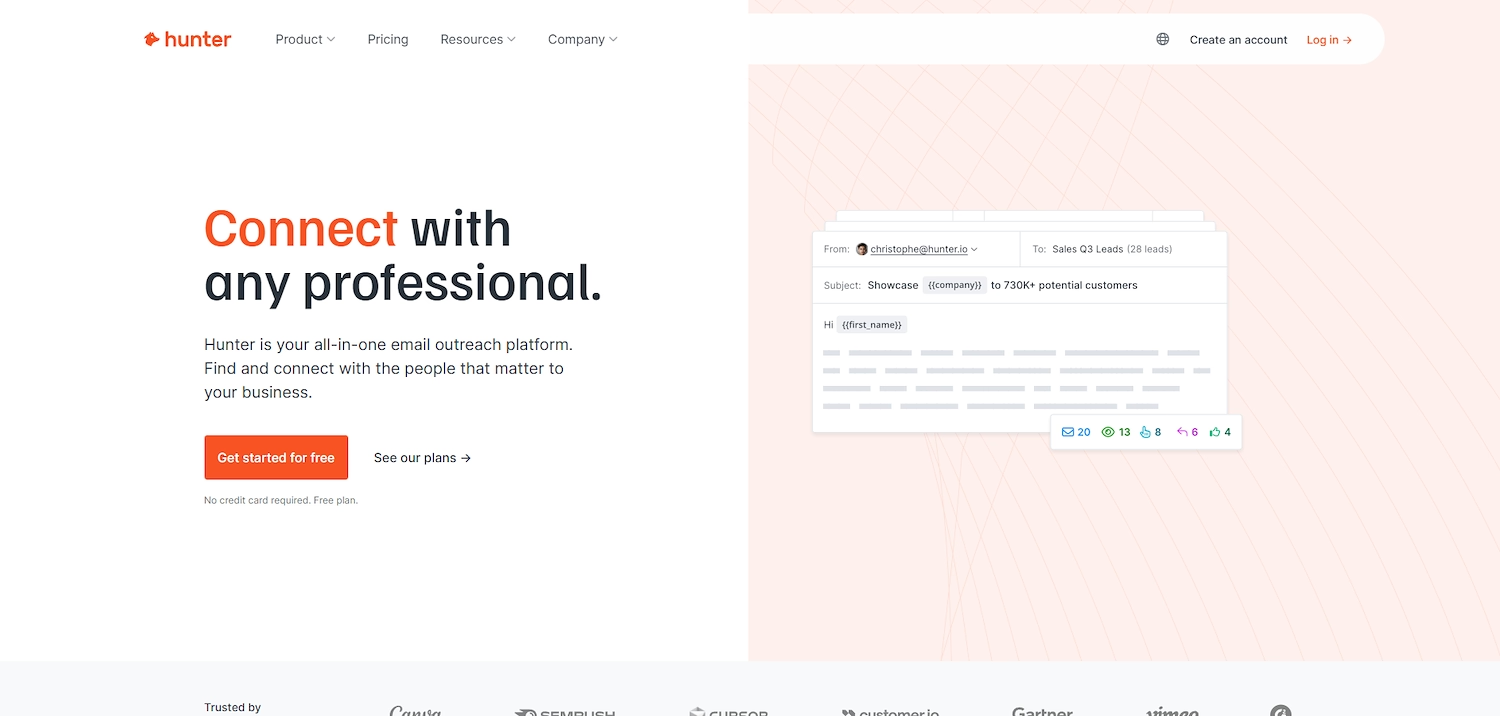
Hunter finds professional email addresses for sales teams. The platform includes a B2B database to build contact lists, tools for data enrichment, and a phone number finder. It also provides features to support sales engagement and outreach.
Hunter's Main Features
- Finds all publicly available email addresses associated with a specific domain name.
- Checks email lists in bulk to reduce bounce rates and protect the sender's reputation.
- Includes a cold-email tool to write messages, schedule follow-ups, and track performance analytics.
- Identifies websites based on the technology stack they use through its TechLookup feature.
Hunter vs. Apollo.io: Key Differences
Average Review score: 4.4/5 stars based on 592 G2 reviews.
- Hunter specializes in email verification and includes a bulk checker to improve deliverability. This is a more focused feature than the broader data enrichment tools within Apollo.io.
- The platform has a simple interface that makes finding contact information easy. In contrast, Apollo.io offers more features, which can make its system feel more complex to some users.
- Its Domain Search tool finds all public email addresses connected to a single company website. This provides a different prospecting method compared to building lists with Apollo.io's advanced filters.
- The tool gathers data by crawling the web for publicly available emails. This approach differs from Apollo.io, which uses a larger database compiled from multiple sources.
Hunter Drawbacks Compared to Apollo.io
- Hunter focuses mainly on finding email addresses. This is different from Apollo.io, which provides a wider range of contact data, including direct-dial phone numbers. This might limit outreach options for teams that use multi-channel strategies.
- The platform's search filters are less detailed than those in Apollo.io. For example, Apollo.io allows users to target prospects based on the specific software they use, a level of granularity Hunter may not offer.
- Some users report that Hunter's database can be smaller. This sometimes results in fewer available contacts for a given search compared to Apollo.io's larger, aggregated database.
- While Hunter has a tool for cold emails, Apollo.io offers more advanced sales engagement. It lets users build complex, multi-step sequences that combine emails, calls, and social media tasks in one workflow.
Pricing and Budget Considerations
Hunter offers paid plans starting at $49 per month, a predictable subscription model. This contrasts with Apollo.io's flexible, credit-based system, which can be more cost-effective for teams with fluctuating usage.
5) Clearbit
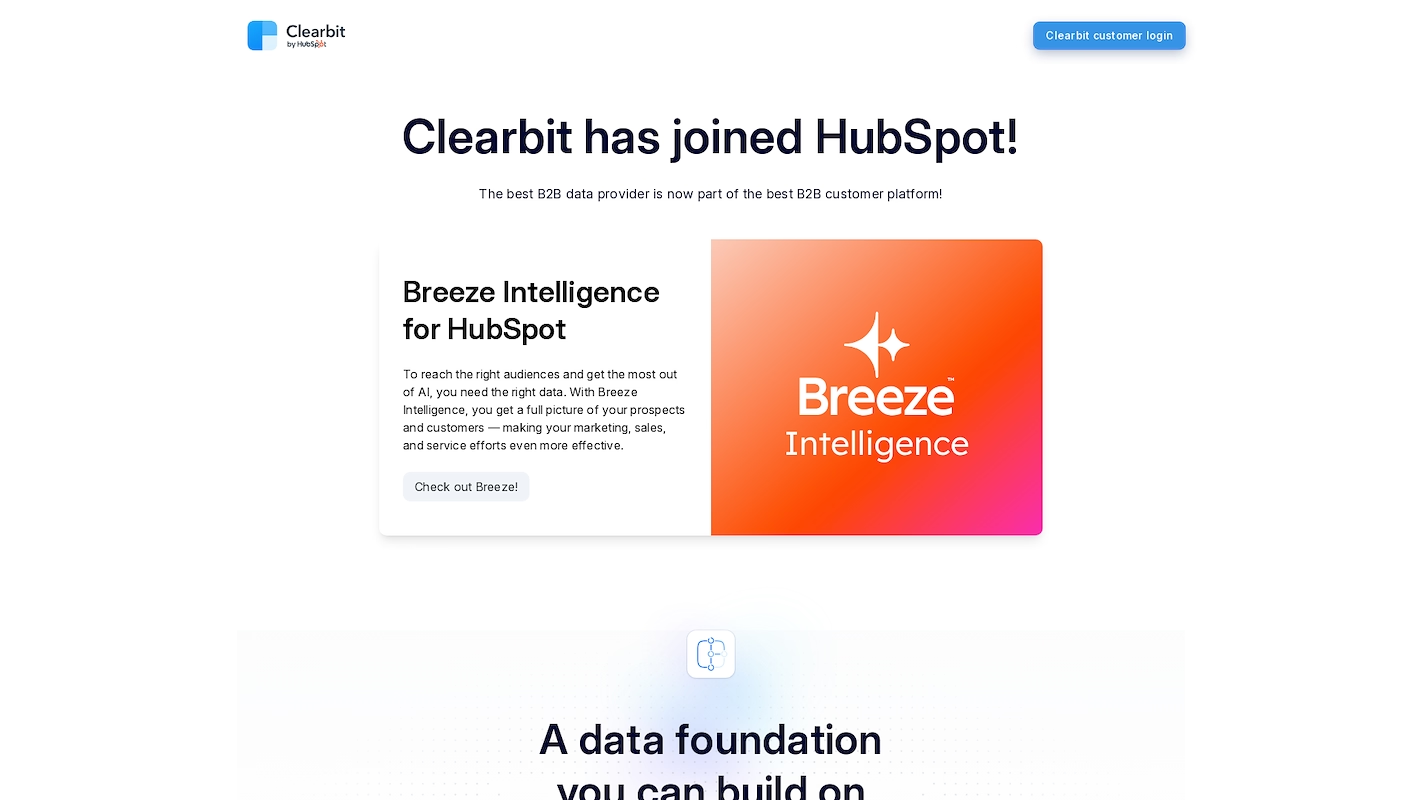
Clearbit is a marketing data platform for B2B companies. It provides data enrichment for websites and CRMs, a B2B contact database, and tools to find emails and phone numbers. Teams use the platform to understand their market, identify ideal customers, and support sales engagement.
Clearbit's Main Features
- De-anonymizes website traffic to identify visiting companies that match an ideal customer profile.
- Removes form fields that the system can enrich automatically, which can shorten the sign-up process.
- Provides data for real-time lead scoring using deep industry classifications and corporate hierarchy mapping.
- Enriches records with firmographic and demographic details, including normalized job roles and seniority.
Clearbit vs. Apollo.io: Key Differences
Average Review score: 4.4/5 stars based on 626 G2 reviews.
- Clearbit identifies anonymous companies that visit your website and turns this traffic into warm leads. This capability is different from Apollo.io, which centers on tools to build outbound prospect lists.
- It can shorten website forms because it automatically fills in data for known visitors. This function helps increase conversion rates and is a feature not found in Apollo.io.
- The tool offers real-time data enrichment for inbound leads to support immediate lead scores and routing. In comparison, Apollo.io's enrichment is generally applied to build and clean static lists for outbound campaigns.
- Its deep CRM integrations, such as with HubSpot, enable automated workflows like lead routes based on enriched data. This focus on marketing automation is more extensive than the sales-oriented CRM functions of Apollo.io.
Clearbit Drawbacks Compared to Apollo.io
- Clearbit focuses on data enrichment and lacks a native sales engagement tool. This is different from Apollo.io, which lets teams build and automate multi-step outreach sequences directly within its platform.
- The tool is primarily designed for enriching inbound leads from website traffic. Apollo.io, on the other hand, provides more extensive tools for outbound prospecting with its advanced lead builder.
- Some users find its contact data is more focused on email and company details. In comparison, Apollo.io often provides a wider range of contact information, including verified direct-dial phone numbers.
Pricing and Budget Considerations
Clearbit's pricing is custom and geared toward enterprise needs, which contrasts with Apollo.io's flexible, credit-based system. For the most accurate information, we recommend visiting Clearbit's official website.
Explore a Different Approach with 11x
If the digital worker concept for sales is relevant to your goals, 11x offers a different model. See how AI agents handle prospecting, outreach, and CRM tasks to support your team. You can explore if this approach fits your go-to-market strategy.
At 11x, we use AI to run your sales playbook. Alice finds accounts and manages outreach, while Julian qualifies leads and sets meetings. Our platform combines data enrichment and outreach, which can replace several tools in a traditional GTM stack.
Book a demo to see our platform in action.
6) Cognism
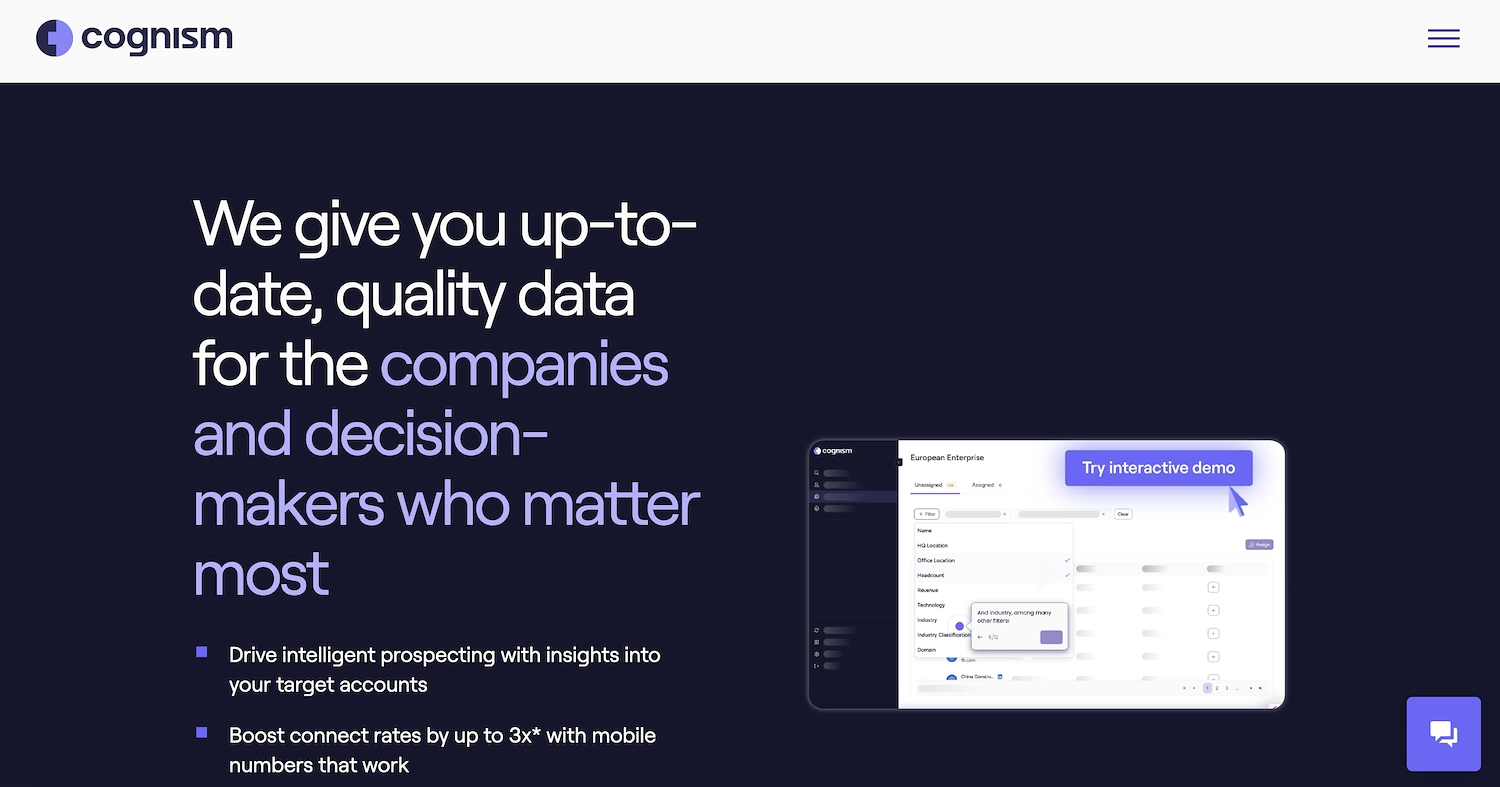
Cognism is a sales intelligence platform with a B2B database for sales teams. It provides tools for data enrichment, an email finder, and a phone number finder to build accurate contact lists.
The platform also includes sales engagement features to help representatives connect with prospects and manage outreach efforts.
Cognism's Main Features
- Offers phone-verified mobile numbers, known as Diamond Data®, which are checked by humans to increase connect rates.
- Maintains extensive data coverage for contacts in the UK and EMEA regions.
- Provides a database of senior-level decision-makers screened against Do-Not-Call lists for compliant outreach.
- Identifies buying signals from hiring trends, funding rounds, and technographic changes.
Cognism vs. Apollo.io: Key Differences
Average Review score: 4.6/5 stars based on 1,033 G2 reviews.
- Cognism provides extensive data coverage for contacts in the UK and EMEA regions, which can be more detailed than Apollo.io's data for those specific areas.
- It offers phone-verified mobile numbers, called Diamond Data®, which are checked by a research team. This process can lead to higher connect rates compared to the standard phone data in Apollo.io.
- The platform screens its database against Do-Not-Call lists in multiple regions. This provides an extra layer of compliance for outreach that is different from Apollo.io's standard data collection.
- The tool identifies specific buying signals, such as company funding and hiring trends. This can offer a more focused approach to finding in-market accounts than Apollo.io's broader intent data filters.
Cognism Drawbacks Compared to Apollo.io
- Cognism does not include a native tool to build complex, multi-step outreach sequences. This is different from Apollo.io, which lets users create and automate entire campaigns that combine emails and calls within its platform.
- Its pricing model typically involves annual contracts, which can be less flexible for smaller teams. In comparison, Apollo.io offers a credit-based system that scales with a company's changing usage needs.
- Some users report that the database has a strong focus on European contacts. This might result in fewer available contacts for North America compared to Apollo.io's broad, global database.
- The platform's setup can take around one month to complete. Some teams may find Apollo.io's implementation process faster, which allows them to start work sooner.
Pricing and Budget Considerations
Cognism uses custom annual contracts, which contrasts with Apollo.io's flexible, credit-based system. For the most accurate pricing information, we recommend visiting Cognism's official website.
7) Seamless.AI
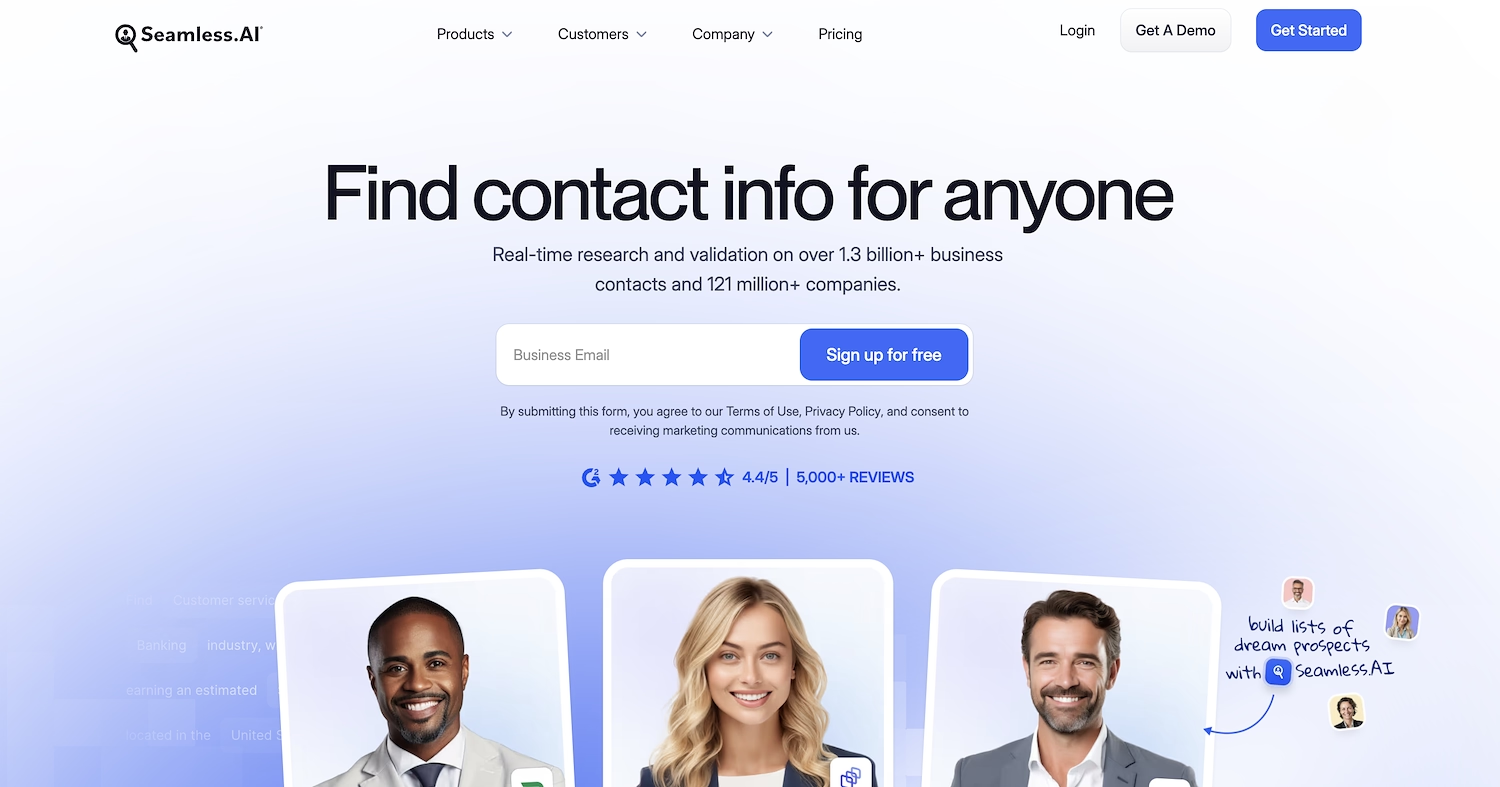
Seamless.AI is a real-time search engine for B2B sales leads. The platform provides a B2B database, an email and phone number finder, and data enrichment tools. It also includes sales engagement features to help teams connect with prospects and manage outreach.
Seamless.AI's Main Features
- Uses an AI-powered, real-time search engine to find contact and company data.
- Identifies buyer intent data to surface prospects who are ready to purchase.
- Monitors job changes among prospects and customers, then automatically delivers new contact information.
- Includes an Autopilot feature that automates list-building to maintain a full sales pipeline.
Seamless.AI vs. Apollo.io: Key Differences
Average Review score: 4.4/5 stars based on 5,067 G2 reviews.
- Seamless.AI uses a real-time search engine to find contact data on demand. This approach differs from Apollo.io, which relies on a large, pre-compiled database.
- Its Autopilot feature automatically builds and adds to prospect lists based on set criteria. This provides a more automated way to maintain a full pipeline compared to the manual list-building process in Apollo.io.
- The tool automatically tracks job changes and delivers new contact information for prospects. This is a more direct update system than Apollo.io, where users typically receive alerts and then search for the new details.
- Many users find the interface simple for quick, real-time searches. This can feel more straightforward than navigating the broader set of features within the Apollo.io platform.
Seamless.AI Drawbacks Compared to Apollo.io
- Seamless.AI does not include a native sales engagement tool. In contrast, Apollo.io allows teams to build and automate multi-step outreach sequences that combine emails, calls, and social media tasks in a single workflow.
- The platform's real-time search can sometimes return fewer contacts for broad searches. Apollo.io, by comparison, uses a large, pre-compiled database that may provide more comprehensive lists for high-volume prospecting.
- Its search filters are less detailed compared to those in Apollo.io. For example, Apollo.io offers more specific criteria, like filtering companies by the technology they use, which supports more targeted campaigns.
- Some users report that data coverage is less extensive in certain international regions. In contrast, Apollo.io's large, aggregated database often provides broader global contact information for teams that target multiple markets.
Pricing and Budget Considerations
Seamless.AI uses an annual contract model and does not list pricing publicly, which contrasts with Apollo.io's flexible credit-based system. For the most accurate information, we recommend visiting Seamless.AI's official website.
8) RocketReach
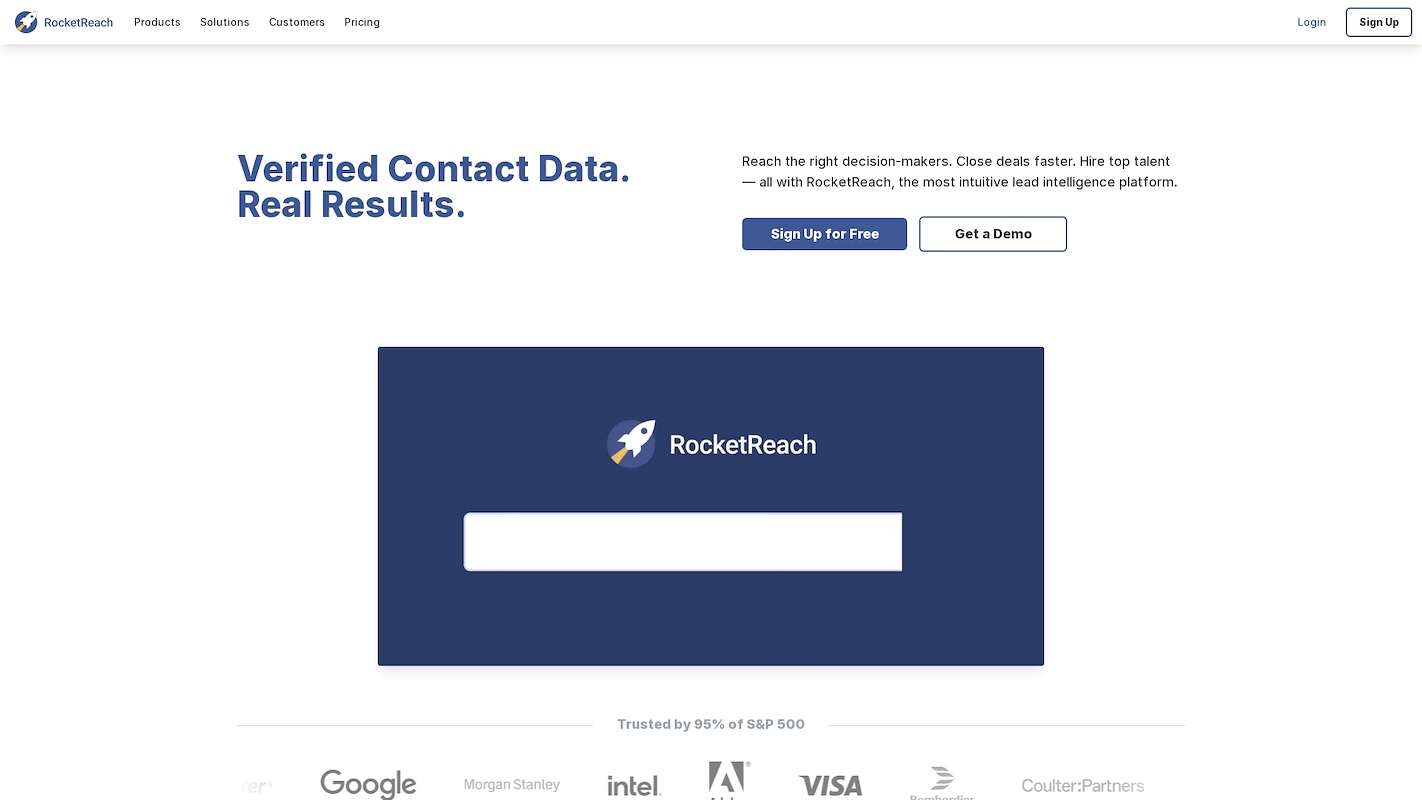
RocketReach is a sales intelligence platform with a B2B database for sales teams. It includes tools for data enrichment, an email finder, and a phone number finder. The platform also offers sales engagement features to help representatives connect with prospects and manage outreach.
RocketReach's Main Features
- Provides access to a database of over 700 million professionals from 35 million companies.
- Offers specialized contact data for the healthcare industry, including professionals in hospitals and administration.
- Includes advanced search filters, browser extensions for Chrome and Edge, and an API for custom integrations.
- Integrates with tools like Salesforce and HubSpot, and connects to other apps through Zapier.
RocketReach vs. Apollo.io: Key Differences
Average Review score: 4.4/5 stars based on 918 G2 reviews.
- RocketReach provides specialized contact data for the healthcare industry. This offers a distinct advantage for teams targeting this niche, an area not specifically detailed in Apollo.io's broader B2B database.
- The platform's database contains over 700 million professional profiles. This large scale provides a vast pool for prospecting, which is a different scope compared to Apollo.io's own extensive dataset.
- It offers extensive integration possibilities through Zapier, connecting to thousands of apps. This provides a different level of workflow flexibility than Apollo.io's direct CRM and sales tool integrations.
- The tool includes a powerful API for building custom data solutions. This gives technical teams more control, which differs from Apollo.io's focus on providing an all-in-one, pre-built system.
RocketReach Drawbacks Compared to Apollo.io
- RocketReach's Autopilot feature for outreach is still in a beta phase. In comparison, Apollo.io provides a fully developed sales engagement suite to create complex outreach sequences.
- Its search filters may seem less detailed for certain needs. For example, Apollo.io allows users to target companies by the technology they use, which supports more specific prospecting.
- The platform works mainly as a contact database with some outreach tools. This is different from Apollo.io, which integrates prospecting, data, and a full sales engagement system in one place.
Pricing and Budget Considerations
RocketReach offers paid plans starting at $99 per month for 100 lookups. This fixed subscription model provides predictable costs. In contrast, Apollo.io uses a flexible, credit-based system that can be more adaptable for teams with variable usage.
9) Snov.io
Snov.io is a sales automation platform. It provides tools to find and verify email addresses. The system also lets users create and manage email drip campaigns to support lead generation and outreach efforts.
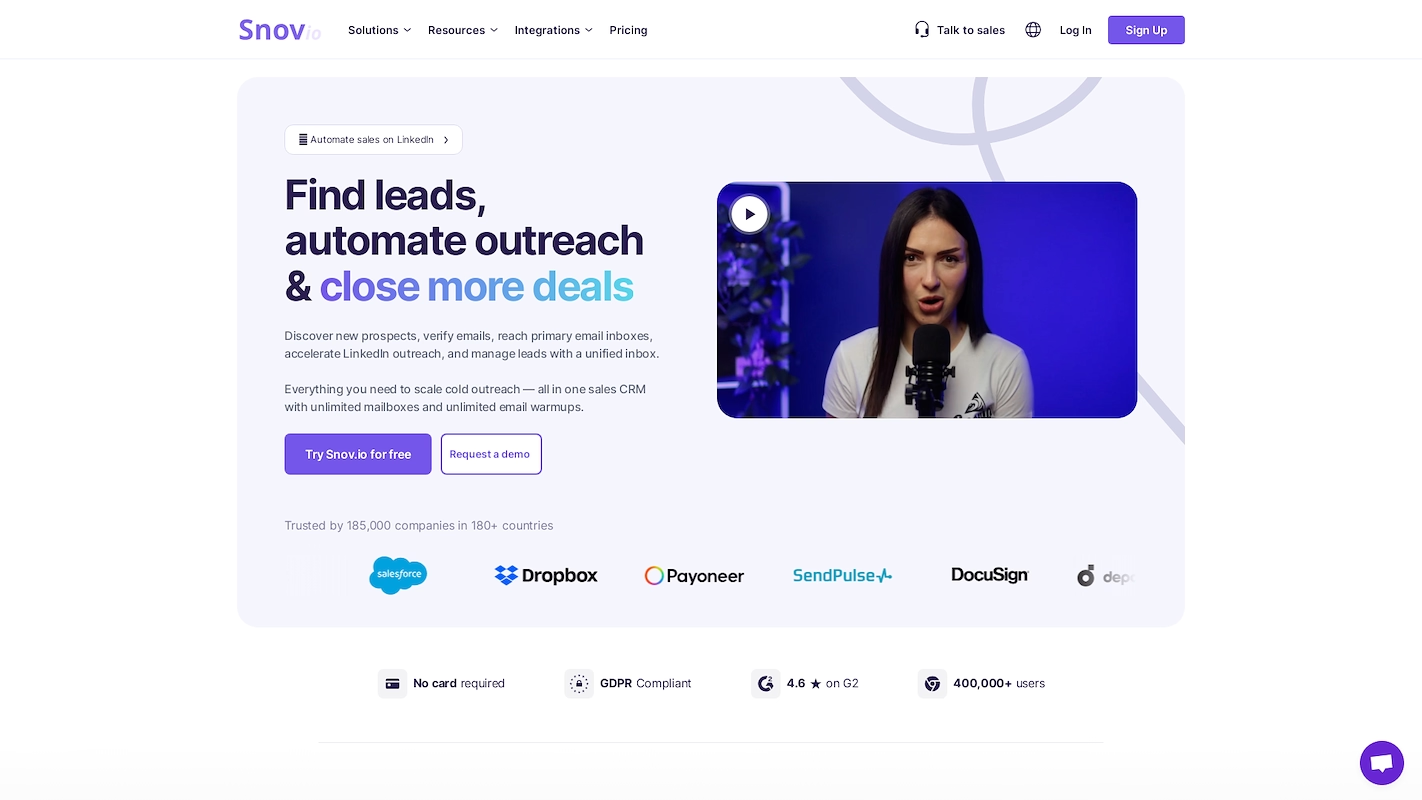
Snov.io is a sales automation platform designed for outreach. It offers tools to find and verify email addresses, which helps build contact lists. The system also allows users to create and manage automated email drip campaigns for lead generation.
Snov.io's Main Features
- Manages contacts, accounts, opportunities, and pipelines within its system.
- Automates lead management and other marketing tasks.
- Offers reporting and analytics capabilities through built-in dashboards.
- Provides access to contact, company, and industry research data.
Snov.io vs. Apollo.io: Key Differences
Average Review score: 4.6/5 stars based on 450 G2 reviews.
- Snov.io includes a built-in CRM to manage contacts, deals, and sales pipelines. This differs from Apollo.io, which requires an external CRM for full pipeline management.
- The platform offers an email warmup feature to improve sender reputation and deliverability. Apollo.io does not provide a native tool for this specific task.
- It provides task and activity management within its system. This allows teams to track all sales actions in one place, while Apollo.io's tasks relate mainly to its outreach sequences.
- The tool combines a CRM, email finder, and outreach automation. This can create a more unified workflow compared to Apollo.io, which pairs its strong data acquisition with other tools for full sales cycle management.
Snov.io Drawbacks Compared to Apollo.io
- Snov.io includes its own CRM, which differs from Apollo.io's model of deep, two-way syncs with external CRMs like Salesforce. Teams committed to an existing CRM may find Apollo.io's integration better for data management.
- The platform lacks a feature to track keyword-based buyer intent. This is different from Apollo.io, which helps users identify companies that actively research specific solutions and allows for more timely outreach.
- Its database is heavily focused on email addresses. Sales teams that use cold calls as a primary channel might find the availability of verified phone numbers more limited compared to the extensive mobile and direct-dial data in Apollo.io.
Pricing and Budget Considerations
Snov.io offers paid plans, such as its Starter tier at $39 per month, which provides a predictable subscription model. This contrasts with Apollo.io's flexible, credit-based system that can be more adaptable for teams with variable usage needs.
10) UpLead
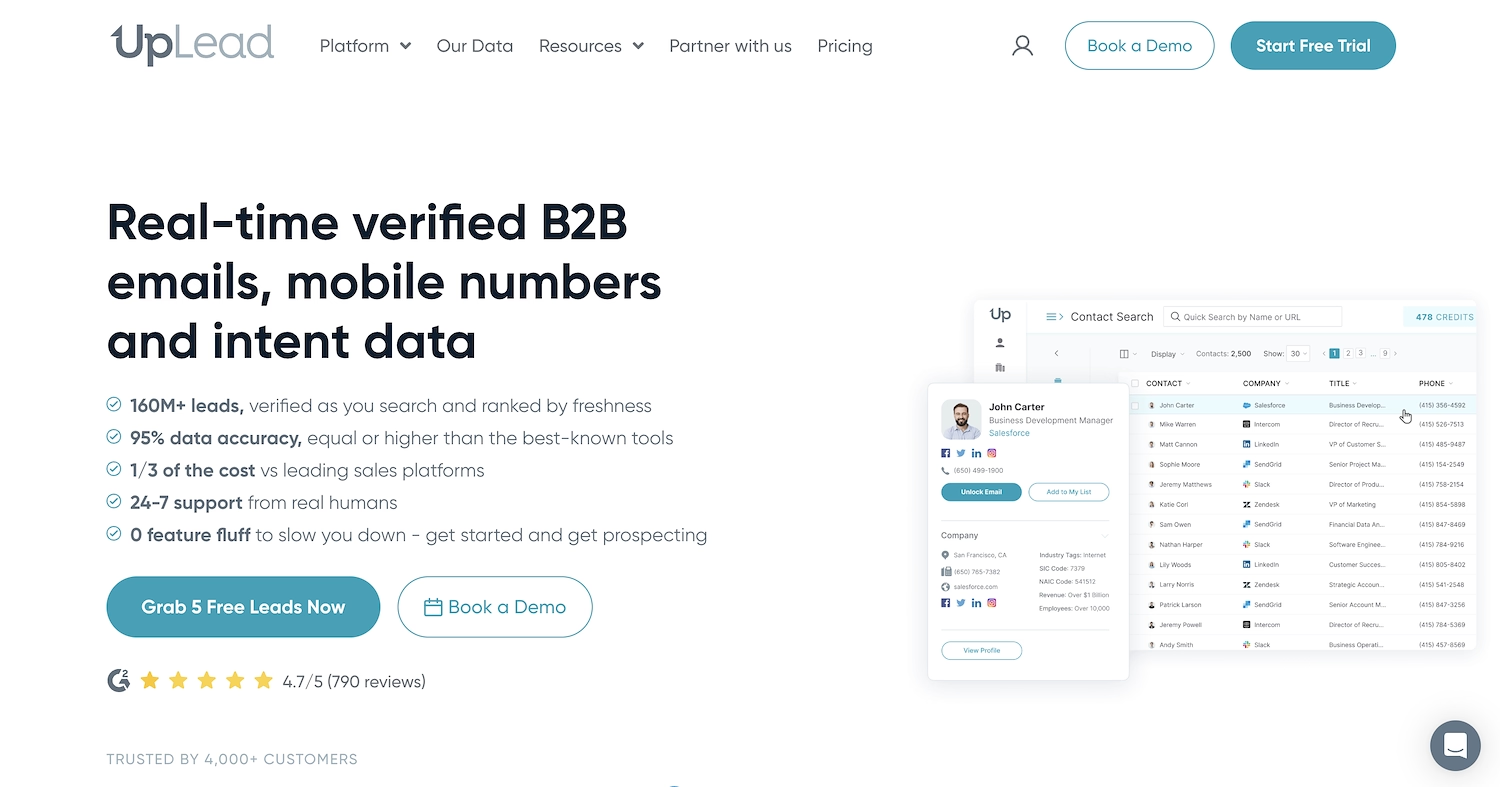
UpLead is a sales intelligence platform with a B2B database for sales teams. It provides tools for data enrichment, an email finder, and a phone number finder to build contact lists.
The platform also includes sales engagement features to help representatives connect with prospects.
UpLead's Main Features
- Verifies emails in real-time to ensure data accuracy at the point of search.
- Uses intent data and over 50 other search filters to identify in-market buyers.
- Provides data cleaning and enrichment for new and existing CRM records.
- Integrates with Salesforce, HubSpot, and other applications through Zapier.
UpLead vs. Apollo.io: Key Differences
Average Review score: 4.7/5 stars based on 797 G2 reviews.
- UpLead verifies emails in real-time at the moment of search. This process aims for high data accuracy, which differs from Apollo.io's reliance on a large, periodically refreshed database.
- The tool is frequently recognized for its intuitive user interface. For some users, this provides a more direct experience for finding contacts compared to navigating the broader range of features in Apollo.io.
- It uses intent data combined with more than 50 other search criteria to identify active buyers. This allows for highly specific list building, a different approach from Apollo.io's broader intent data signals.
- The platform focuses on data cleaning and enrichment for CRM records. This helps maintain data hygiene, which is a similar function to Apollo.io's enrichment but with a strong emphasis on real-time verification.
UpLead Drawbacks Compared to Apollo.io
- UpLead lacks a native sales engagement feature. In contrast, Apollo.io includes a tool to build and automate multi-step outreach sequences with emails and calls. This keeps the entire workflow in one place.
- This tool functions mainly as a B2B data provider. Apollo.io, on the other hand, offers an all-in-one platform that combines prospecting with a full sales engagement suite. This approach can reduce the need for multiple separate tools.
- Some users note that its database can have fewer contacts for certain niche searches. In comparison, Apollo.io's large, aggregated database sometimes provides a wider selection of prospects. This is useful for high-volume outreach campaigns.
Pricing and Budget Considerations
UpLead offers paid plans starting at $99 per month for its Essentials tier, providing predictable costs. This contrasts with Apollo.io's flexible, credit-based system, which can be more adaptable for teams with variable usage needs.
Which One Should You Go With?
Many variables influence the choice of an Apollo.io alternative. This guide reviewed several options to help you find the right fit for your team's specific needs and go-to-market strategy.
If you are exploring a different model, 11x uses AI agents to manage sales tasks like prospecting and outreach. This approach can replace several tools in your GTM stack and may offer a new way to support your sales team's operations.




